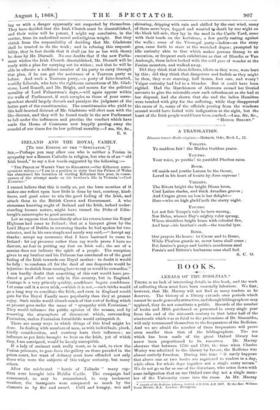IRELAND AND THE ROYAL FAMILY. [To THE EDITOR OF THE
"SPECTATOR."] SLR,—Perhaps you may allow one who is neither a Fenian in sympathy nor a Roman Catholic in religion, but who is of an "old Irish breed," to say a few words suggested by the following TUB PRINCE OF WALES'S VISIT TO KILL&ENEY.—Our Killarney Corre- spondent writes :—`I am in a position to state that the Prince of Wales has abandoned his intention of visiting Killarney this year, in conse- quence of the attempt made on his brother's life in Victoria.'—Cork Examiner."
cannot believe that this is really so, yet the bare mention of it makes one reflect upon how little is done by tact, courtesy, kind- liness, and good sense to win the good feeling of the Irish, and attach them to the British Crown and Government. A wise statesman knowing aught of Ireland and the Irish, indeed under- standing human nature, might have turned the Duke of Edin- burgh's catastrophe to good account.
Let us suppose that immediately after his return home his Royal Highness had come to Ireland ; that at a banquet given by the Lord Mayor of Dublin in returning thanks he had spoken for two minutes, and in his own simple and manly way said,—" Accept my thanks : accept my assurance that I have hastened to come to Ireland : let my presence rather than my words prove I have no distrust, no fear in putting my foot on Irish soil ; the act of a maniac does not indicate the spirit of a people. The reception given to my brother and his Princess has convinced us of the good feeling of the Irish towards our Royal mother : to doubt it would be folly : to condemn all for the deed of one desperado would be injustice: to shrink from coming here to say so would be cowardice." I can hardly doubt that something of this sort would have pro- duced a good effect not only in this country, but in England. Courage is a very princely quality, confidence begets confidence. Let some call it a mere trick,—which it is not,—such tricks would go a long way to conciliate the Irish, and even in England would gain for the Royal Family more popularity than they at present enjoy. Such tricks would absorb much of that sort of feeling which at present goes under the name of "sympathy with Fenianisin." They would influence the public opinion of the masses, and by removing the atmosphere of discontent which, surrounding
Fenianism, makes Fenianism formidable would extinguish it. There are many ways in which things of this kind. might be done. In dealing with numbers of men, as with individuals, pluck,
kindly consideration, and courtesy have their influence ; an influence as yet little brought to bear on the Irish, yet of which they, I am convinced, would be keenly susceptible.
If a lady of eminent rank really went, as is said, to view the Fenian prisoners, to gaze from the gallery on those paraded in the prison court, her want of delicacy must have offended not only those who were the subjects of this vulgar curiosity, but many others.
After the celebrated "battle of Tallacht " many cap- tives were brought into Dublin Castle. The campaign had commenced, as may be remembered, in very inclement weather, the insurgents were conquered as much by the elements as by fire and sword. Cold and hungry, wet and shivering, dripping with rain and chilled by the east wind, many of them mere boys, fagged and wearied te death by one night on the bleak hill-side, they lay in the mud in the Castle Yard, some with their heads on the kerbstone, a few partly resting against the walls ; some of the Viceregal party—ladies—as the story goes, came forth to stare at the wretched dupes; prompted by idle curiosity akin to that which makes persona throng to an execution, or frequent such exhibitions as that of Blondin or Van Amburgh, these ladies looked with the cold gaze of wonder at the Fenian monsters, and walked away.
Did they think that these fellows, idiots as they were, were hurt by this; did they think that dangerous and foolish as they might be then, they were starving, half frozen, foot sore, and weary? Vulgar curiosity had led to a blunder. But it could have been righted. Had the Marchioness of Abercorn caused her liveried servants to give the miserable crew such refreshment as she had at her disposal, had she shown that she and the ladies Hamilton were touched with pity for the suffering, while they disapproved the cause of it, many of the officials peering from the windows around would have boiled with indignation at the sight, but the heart of the Irish people would have been reached.—I am, Sir, &c.,
" Hoxon BRIGHT."






























 Previous page
Previous page